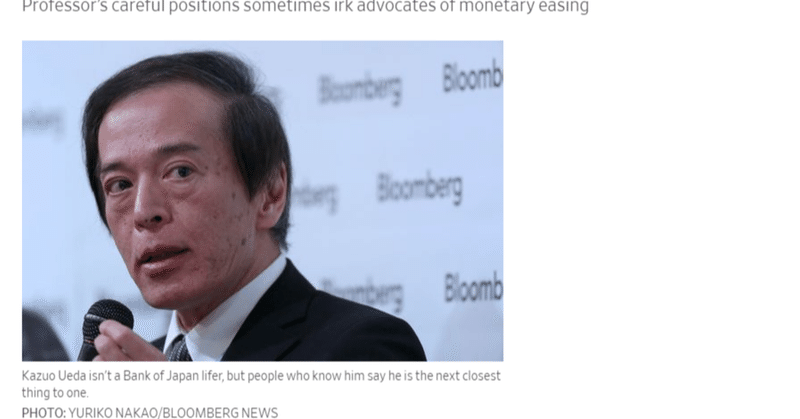
【翻訳】日銀総裁に指名された植田氏、現実的な日銀事情通と評価されるも慎重姿勢が金融緩和論者の反感を買うことも

[東京]-火曜日に日本の中央銀行のトップに指名された植田和男氏は、日本銀行の文化に浸った現実主義者で、対立する陣営の間でバランスを取ることを目指すだろうと、彼を知る人々は言う。
植田氏(71)は著作で、どのような立場も主張せずにシナリオやリスクを論じる傾向があり、より積極的な行動を望む人たちを時々いらだたせる。
植田氏は、低迷する日本経済には金融刺激が必要だと考えているというが、低金利による収益圧迫を訴える銀行家の意見にも同調している。日本の高い政府債務は問題ではなく、もっと高くてもよいという理論にも精通しているが、債務が制御不能になることを恐れる財政タカ派にもうなずいている。
植田氏とは1970年代に一緒に論文を書いて以来の付き合いだというエール大学の浜田宏一名誉教授(経済学)は、「彼はいろいろなアイデアを柔軟かつ公平に考え抜く」と述べた上で、「意見が割れてもバランスを取り、冷静に政策運営できる人なので、この仕事に適任だ」と指摘する。
強力な金融刺激策を主張する浜田氏は数年前、主要な経済学者とのインタビューの本のために植田氏に接触した。浜田氏がその話をすると、植田氏は「あまりにも非現実的だ」と言って断ったという。植田氏が教鞭をとる共立女子大学の担当者は「コメントは控えさせていただきます」と述べた。
この指名は数週間以内に国会で承認される見通しだが、4月に任期を終える黒田東彦現総裁の下で導入された10年にわたる大規模な資産買い入れ政策を転換するよう、日銀への圧力が高まっていることを受けたものである。
日銀には、米連邦準備制度理事会(FRB)が行ったように金利を引き上げることを望む声もある。また、昨年1.1%成長し、2019年時点と比較して規模が小さくなっている日本経済には、あらゆる金融的後押しが必要だとする者もいる。
日銀総裁候補として名のあがった候補者には、日銀で数十年の経験を積んでいる者もいた。経済学部教授の植田氏は意外な人選で、日銀の生え抜きではないが、彼を知る人々は、彼がそれに次ぐ存在であると言う。
植田氏はマサチューセッツ工科大学で経済学の博士号を取得し、東京大学で経済学の教授を務めていた。
1998年から2005年まで教授職を休職し、日銀の政策委員を務め、9人の意思決定機関のメンバーとしては異例の影響力を持った。
中央銀行が景気後退期に金利を引き下げるだけでなく、その効果を最大化するために一定期間金利を低く抑えることを約束するフォワードガイダンスの概念の先駆者でもある。景気過熱の際の利上げの時にも同じ考え方があり、現在では世界の多くの中央銀行が採用している。
植田氏は、大学の仕事に戻った後も、中央銀行関係者と親交を深めていた。日銀の研究所で特別顧問を務めたり、日銀主催の国際会議ではモデレーターを務めたりしてきた。
日銀の本支店によく顔を出し、役員食堂での昼食会にも参加したと、植田氏と仕事をともにしたことのある複数の関係者は語る。日本銀行の上層部は東大の法学部や経済学部の卒業生で占められている。
日銀の元理事で野村総合研究所のエコノミストである木内登英氏は、こうした経歴は、黒田総裁がとってきた異例の措置を巻き戻す過程で植田氏を助けることになるだろうと語った。
木内氏によれば、日銀は現在0.5%に設定されている10年物国債利回りの上限を引き上げる可能性があるという。植田氏はおそらく、この変更を技術的な微調整として提示するだろう、と木内氏は述べた。
東京にあるPwCコンサルティングのチーフエコノミストで元日銀理事の片岡剛士氏は、「これまでの発言から、早まった利上げをする可能性は低い」と指摘する。植田氏が債券トレーダーを喜ばせるためだけに金利を変更することはないだろうと述べた。
植田氏は2000年に日銀がゼロ金利政策を解除した際に反対票を投じたことで知られているが、日銀ウォッチャーの間では、2013年に始まった黒田時代の緩和策に必ずしも賛成していなかったと言われている。
日銀の政策委員を務めた経済学部教授の原田泰氏は、植田氏が2016年の懇親会で、日銀が債券利回りをコントロールしようとする際のハイパーインフレのリスクに言及するスピーチをしたと振り返った。原田氏は、日本経済を活性化させる方法として黒田氏の政策を擁護するカウンタースピーチを行うよう主張したという。
原田氏はこの出来事について本に書き、電話インタビューでもその内容を再確認した。日銀はそのレセプションの記録はないと言っている。
2023年2月15日付の紙面に「BOJ Pick Is Seen as Pragmatic Insider」として掲載されました。
Kazuo Ueda, Tapped as Bank of Japan Chief, Is Seen as Pragmatic Insider
Professor’s careful positions sometimes irk advocates of monetary easing
TOKYO—Kazuo Ueda, who was picked Tuesday to lead Japan’s central bank, is a pragmatist steeped in the institution’s culture who is likely to seek balance among competing camps, say people who know him.
In his writings, Mr. Ueda, 71, tends to discuss scenarios and risks without advocating any position, sometimes irking those who want more aggressive action.
Mr. Ueda has said he thinks Japan’s weak economy requires monetary stimulus, but has also sympathized with bankers who complain that low interest rates are hitting their profits. He shows familiarity with theories that suggest Japan’s high government debt isn’t a problem—and perhaps should go even higher—but he also nods to fiscal hawks who fear the debt could spiral out of control.
“He thinks through various ideas flexibly and fairly,” said Koichi Hamada, an emeritus professor of economics at Yale University who has known Mr. Ueda since the 1970s when they worked together on a research paper. “He is the right person for the job because he is able to keep balance and manage policy calmly when views are split.”
Some years ago, Mr. Hamada, an advocate of strong monetary stimulus, approached Mr. Ueda for a book of interviews Mr. Hamada was conducting with leading economists. As Mr. Hamada tells the story, Mr. Ueda said no, explaining that he found his former colleague too doctrinaire. A representative of Kyoritsu Women’s University, where Mr. Ueda teaches, said he wasn’t available for comment.
The nomination, which Parliament is expected to approve in coming weeks, comes as pressure is growing on the Bank of Japan to shift its decadelong policy of large asset purchases introduced under the current governor, Haruhiko Kuroda, whose term ends in April.
Some want the BOJ to raise interest rates as the Federal Reserve has done. Others say Japan’s economy, which grew 1.1% last year and is still smaller than it was in 2019, needs all the monetary push it can get.
Several candidates mentioned for the BOJ job had decades of experience at the central bank. Mr. Ueda, an economics professor who was a surprise choice, isn’t a BOJ lifer, but people who know him say he is the next closest thing to one.
He earned a doctorate in economics at the Massachusetts Institute of Technology and was a professor of economics at the University of Tokyo.
He took a leave from academia to serve on the BOJ’s policy board from 1998 to 2005, where he had an unusual level of influence for a member of the nine-person decision-making body.
He helped pioneer the concept of forward guidance, in which a central bank not only cuts rates during an economic slowdown but also promises to keep them low for a certain period with the aim of maximizing the effects. The same concept can be used in raising rates when an economy overheats, and many global central banks use it today.
After returning to his university job, Mr. Ueda stayed close to officials at the central bank. He has held a position there as a special adviser to the BOJ’s research institute and served as a moderator at international conferences held by the BOJ.
People who have worked with him say he was often seen at the central bank’s offices and joined lunch meetings at the executive dining room. The central bank’s upper ranks are populated with University of Tokyo graduates in law or economics.
That background will likely help Mr. Ueda navigate the process of dialing back some of Mr. Kuroda’s extraordinary steps, said Takahide Kiuchi, a former BOJ board member and an economist at Nomura Research Institute.
Mr. Kiuchi said the BOJ could raise its cap on the 10-year Japanese government bond yield, currently set at 0.5%. Mr. Ueda would likely present the change as technical fine-tuning, Mr. Kiuchi said.
“Based on his previous remarks, he is unlikely to make a premature rate increase,” said Goushi Kataoka, chief economist at PwC Consulting in Tokyo and a former BOJ board member. He said Mr. Ueda wouldn’t change rates just to please bond traders.
Mr. Ueda is known for casting a dissenting vote in 2000 when the BOJ lifted its zero-rate policy, but BOJ watchers say he didn’t necessarily agree with the easing measures in the Kuroda era that began in 2013.
Yutaka Harada, an economics professor who served on the BOJ’s policy board, recalled a reception in 2016 at which he said Mr. Ueda gave a speech mentioning the risk of hyperinflation as the BOJ tried to control bond yields. Mr. Harada said he insisted on giving a counterspeech defending Mr. Kuroda’s policies as a way to revitalize the Japanese economy.
Mr. Harada wrote about the incident in a book and reaffirmed his account in a phone interview. The BOJ said it didn’t have a record of the reception.
Appeared in the February 15, 2023, print edition as 'BOJ Pick Is Seen as Pragmatic Insider'.
サポートよろしくお願いします。サポートしていただいた分は書籍の購入などクリエイターとしての活動費に使い、有益な情報発信につなげていきたいと考えています。
